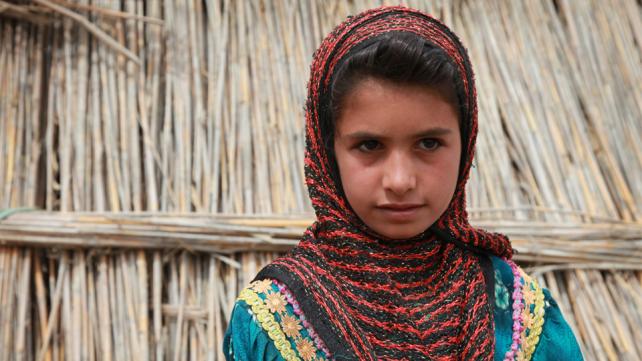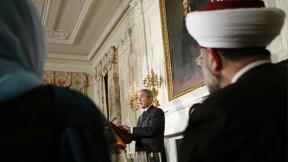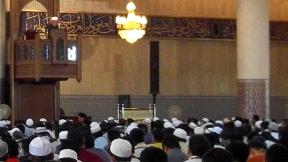
Working to help others, also known as social service, is an Islamic obligation. Muslims carry out this obligation on an individual level. However at the institutionalized and collective levels Muslims in America, by and large, neglect this duty. Muslims in America live within their own communities like islands. It is vital that these islands become connected to the broader American society by building bridges through social service. There is hardly any evidence of social service institutions built and run by Muslims as compared to what is being done by other faith groups.
Social services can be divided into two major categories although some overlapping does exist:
- Family Service: pre-marriage counseling, resolving marital disputes, spousal abuse, child abuse, domestic violence, foster parenting, women's shelters, marriage counseling, job placement, economic rehabilitation of battered women, Islamic and legal advice to the abused.
- Support Services: halfway houses for parolees, homeless shelters, skills development, placement services, soup kitchens, food pantries, legal counseling, literacy, Islamic education and mentoring.
Alhamdu lillah, Muslims are gradually becoming aware of this need although the work, up to now, has been limited to small endeavors. There are a few small and underfunded efforts throughout North America. Currently, our African-American Muslim brothers and sisters are at the forefront of these efforts. In a handful of instances immigrant Muslim women and second generation Muslims are also addressing these issues.
There are many causes for this weakness. Among them are the extraordinary growth of Masjids and schools which has probably taken up most Muslim resources in the last two decades, along with humanitarian disasters in the world for which Muslim Americans have been donating generously.
However, the above factors do not take into account some misperceptions among Muslims which continue to contribute to an almost total absence of social service in the priorities of Masjids and other Muslim organizations. Below are some of the major Muslim misperceptions which need to be addressed as the Muslim leadership tries to make social services a priority for the Muslim community in North America.
Misperception #1: Social service is not an Islamic obligation
Muslims regard helping the needy and the poor as good and rewarding acts but they do not consider them necessarily "an obligation" like prayers and fasting. It seems that many are not aware of the Quranic basis for the duty to serve human beings. There are scores of verses in the Quran that deal with the necessity of social service: 107; 74:38-46; 90:12-18; 89:17-24; 92:5-10. Of course the more prominent one is the short chapter Al Ma'oon in which Muslims are Divinely mandated to attend to the social needs of others, not as a philanthropic gesture, but as a prerequisite condition for faith (Iman) itself, and a tangible acceptance of the Hereafter. In al Ma'oon 107:1-7, Allah says:
"Have you ever seen a human being who contradicts the (essence of) faith? That is the person who pushes the orphan aside and does not promote feeding the needy."
Woe, then, unto those who pray, but their hearts and minds from (the essence and message of) their prayers are remote, those who (want but) to be seen and praised, whereas they refuse to help others (who need help)"
Although no one will deny that Zakat is a pillar of Islam, it is at best a fallen pillar of Islam whose recommended list of beneficiaries reads like a roster of social service priorities for Muslims.
Misperception #2: There is no tradition of Islamic social services
In most Muslim countries, the Masjids and Madrassas are the places where the hungry and homeless have ready food and shelter. Masjids in America offer neither. Muslims in America are not generally aware of the kinds of social services Muslims in other countries operate. I will enumerate a few historic institutions here.
The Waqf system is a common Islamic endowment system which has helped and continues to support millions of social service projects in the Muslim world. I remember in my own neighborhood, an orphanage (yateem khana) and several cold water fountains (sabeel) in a city where temperatures are hardly below 100 fahrenheit will bring thankful prayers to your lips. Free Musafirkhana (public guest house for travelers) also stood in my hometown, free for not only the travelers but also those who have no other place to go. The first formal public guest house was established in 17 Hijrah in Madinah, after which every city throughout the world of Islam has at least one before Khalifa Omar passed away. Until these independent public guest houses, the travelers used to stay in Masjids.
There are many examples of institutionalized human services which are found in the Muslim world. A wider knowledge of these institutions and their workings may encourage institutionalization of social services among Muslims. Historically, the Khanaqah in Central and South Asia, Zawiyah in North Africa, and Tekke in Turkey (an open for all house of Sufis) has been a common food and shelter spot. Lungers (soup kitchens) were found all over Muslim Asia. Some Lungers, like the one in Ajmir, are so huge that their Daig (cooking pots) are two stories high, feeding thousands of people on a daily basis. Daruz Zuafa (literally house for the weak which used to take care of the needs of the elderly) were still operational in Nizam's Hyderabad Deccan in India as late as the early seventies. One can still take a small note from any of the Nizam's children to find accommodation in free Ribats (big house) in Makkah and Madinah of Saudi Arabia until the late seventies which were established there by Nizam's endowments.
In Islam it is the legal right of a needy person or a traveler to be fed by the community. Most Masjids in the Muslim world stay open 24 hours a day seven days of week for this reason. It is this massive act of silent support which essentially took care of millions of Afghan refugees in Pakistan and Iran in the last twenty years, while only a fraction of these refugees were being taken care of by international refugee agencies.
Misperception #3: Zakat is only an individual duty
Most Muslims in America distribute their Zakat on an individual basis. Historically and Islamically that has never been the case. Giving Zakat is a personal obligation but its collection and distribution have always been a collective responsibility. This has enabled Muslims to help the less fortunate in an organized fashion and take up projects of a larger scale. By bypassing communal collection and distribution, Muslims are denying the community the duty of attending to its priorities in an organized fashion which has diminished our ability to undertake social service projects. Only a major campaign of reeducation can help Muslims reassert this fallen pillar of Islam.
Misperception #4: The real poor are not in America
Muslims in America have a dilemma: Since almost half of us were born in the Third World, we compare the face of poverty in America with the one "back home." Unfortunately, in our blind materialistic pursuit of the American Dream we find it hard to see that there is a great deal of poverty and homelessness right here in America. And so we send our money to our homes. While Islamic law asks for distribution of Zakat in the localities where it is collected from, the morality of "earning here" and "charity abroad" is denying the effective implementation of two of the designated Zakat categories, one being "helping prisoners" and the second "assisting new Muslims". While there is merit and logic in helping poor people in the Third World, many American poor and homeless are sadly living in similar conditions. Maybe an equitable distribution between our responsibility towards our neighbors and back home is a better option. Many references can be found in Quran about neighbors and their rights.
Misperception #5: Muslim family life is safe and sound
The divorce rate in America is one of the highest in the world (over 50 percent). But the divorce rate of Muslims in North America is almost as high, according to New York-based sociologist Ilyas Ba-Yunus. Many Muslims are simply not aware of the extent to which Muslim marriages are in trouble. In Chicago, most occupants of a shelter run by Hindus are Muslim women. Tremendous help is needed in marriage counseling, mediation, assistance in the case of abuse, foster parenting, and shelters. Untrained Imams are being forced into the role of family counselors. Although this is the only area of social services where need is forcing a bit of movement, a proper understanding of the magnitude of the problem may help Masjids allocate more funds in this direction.
Misperception #6: Islam is the fastest growing religion in the USA
I don't know who came up with this phrase. I have not seen any research paper about it. However, what I have seen is its obnoxious usage by the unwise. In fact, 70 percent of converts leave Islam within a few years as documented by Prof. Ilyas Ba Younus. Muslims are unaware that a majority of new Muslims end up leaving Islam because of a lack of support system in the Muslim community. Their study of Islam through books does not match the reality of our brotherhood and sisterhood. Not all, however, leave because of the absence of the support system. It is a complex phenomena with many other variables.
Misperception #7: Muslims cannot befriend non-Muslims
Interestingly, this is not a quote from the media, this is actually a street ideology paddled by some fringe groups in the community to the extent that it has caused true confusion among young and the new Muslims. The whole theory was invented to keep Muslims away from participation in the political system in North America. It relies on the incorrect translation of the term Wali in the Quran. Wali was a term at the time of the Prophet (peace and blessings be upon him), whose modern-day equivalent is citizenship in the eyes of scholar Professor Muhammad Hamidullah. However, the literal translation of the word may mean friendship as well. Although in Islamic discourse it is a well-established principle that a term loses its literal meaning unless the context dictates it, the street ideologues had a field day with the term Wali, declaring that Muslims cannot befriend non-Muslims. The translators could not foresee the political usage of their translation. Because of this misunderstanding, many Muslims in America probably limit their social obligation towards Muslims only, although this behavior runs contrary to the example of the Prophet (peace and blessings be upon him). I have addressed the question theologically in a separate article.
There are Friday sermons which have been disrupted by the extremists among us when the Imam tried to encourage Muslims to participate in society as responsible citizens. Unfortunately, these voices of isolation have yet to learn from the Prophet of Mercy, may Allah's mercy and blessings be upon him, who lived and died while concerned for humanity.
Misperception #8: No talk of the brotherhood of human beings
We are so focused on our own victimization that we fail to see the pain of others. We are indeed victims of internal and external oppression. The largest number of refugees in the world are Muslims. Our blood flows from India to Palestine every day. However, a partial reason for our plight may be that instead of being servants of humanity, like the Prophet (peace and blessings be upon him) was, we became self-centered. Allah tells us in the Quran that He has created all of us with the same one father and one mother. He repeatedly calls all of us Bani Adam (family or children of Adam) in the Quran. If that does not create the brotherhood of humanity, what else will? Our emphasis on Muslim brotherhood hides the fact that the mission of this brotherhood is to serve humanity at large. Unless we personalize the pain of others so much that it shows through our words and deeds, we may not succeed in helping others learn how wronged we feel.
Muslim brotherhood is an integral part of the brotherhood of humanity, not some utopia outside humanity.
Misperception #9: Can Zakat be used for non-Muslims?
Many Muslims, including some leaders, are unclear as to whether Zakat and non-Zakat charity are to be used only to help other Muslims or to help anyone who is in need.
The Islamic position to assist all in need without discrimination is so obvious that it does not require any Fatwa. The Quran even challenges those who were opposing Islam at the time of the Prophet (peace and blessings be upon him) to come forward with charity towards the needy. In Khalifa Omar's declared and implemented interpretation of the Quranic category of Zakat distribution, Faqir meant the poor of the Muslims, and Miskeen meant the poor of Christians and Jews. Later on, as Islam encountered other faith groups, he extended social benefits to them as well. May Allah be pleased with him.
However, at this age of decay in Islamic life somehow the concept of serving one's own has restrained some Muslims from using Zakat to serve all of humanity.
Misperception #10: Only a Muslim neighbor has a right on you
The concept of neighborly duties has also evaporated since most Muslims either limit the definition of neighbor to exclude non-Muslims or fall prey to the elevator culture by not noticing their neighbors.
Nowhere in the Quran and the Sunnah are the rights of neighbors limited to Muslims only. A neighbor is a neighbor. And the Islamic definition of neighbor is broader than the English language description as the following verse of the Quran states: "Do good to…the neighbor who is close by and to the neighbor who is a stranger, and the companion at your side, and to the traveler.." (4:36). This false understanding allows some practicing Muslims to not focus on fulfilling neighborly duties towards society, although this may be because of their irresponsibility rather than an assertion of this false notion.
The Need for Education:
These misperceptions must be shattered if we are to move our community forward and truly address its full contribution in the arena of social services. The first step in clarifying these misconceptions is education on a mass level amongst Muslims in North America. Below are some practical ways to do this:
- Use Friday Khutbas to the maximum. Many Muslims who don't normally attend other Islamic activities come to Friday prayers, making them an excellent forum for education. Muslim councils and Imams should develop sample Khutbas to on the above-mentioned topics and present them to Muslim audiences.
- Muslim leaders should write about the topic in Muslim magazines by publishing editorials in all of them about the need for social services offered by Muslims.
- Muslim writers should publish articles in every issue of the various Muslim newspapers on social problems and the need to address them.
- Someone should write a book that discusses social services as an Islamic obligation, reflects on the nature of this need, and also provides practical information on how to address these problems in today’s environment. This book can also share the historical experience of Muslims in the area of social services. Another small book is needed to clarify the issues of Wali, friendship, duties to neighbors and helping the community we live in.
- We need to publicize success stories through the media. The only hospital run by students of a Muslim Students' Association is in America. Why do so few people know about this extraordinary accomplishment by students in California?
- Muslim schools should incorporate the Quranic chapters and verses regarding service to humanity along with articles on the concepts above in their curriculum.
There are existing resources available among Muslims which can become the starting point of these educational efforts. Sound Vision's website itself contains hundreds of pages worth of information on social service-related issues. The Islamic Social Services Association of the United States and Canada (ISSA) and a few seminars by the Islamic Society of North America (ISNA) have also generated some material which should be useful in clarifying some of these concepts.
The Muslim community in America is one which thinks dynamically. It cannot afford not to move towards building bridges of selfless service in the society we live in.
Photo Attribution: FunkMonk - http://commons.wikimedia.org/wiki/File:Marsh_Arab_girl.jpg








Comments
I couldn't have said it better.I have composed a proposal to insitute such an effort. Yet, no matter where I turn, it seems to get a deaf ear!!!I believe that if we can locate enough people willing to act on this type of Work, we will be successful.I look forward to further communications on this subject, and to share my concerns.Walakum As-Salam,Muhammad Hasan Mubarak
Location
Pages
Add new comment